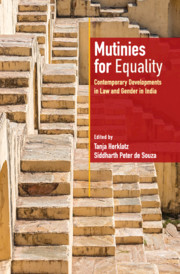5 - Is Sexuality Anti-Indian? Reflections on Obscenity in Contemporary Indian Popular Discourse
Published online by Cambridge University Press: 08 June 2021
Summary
Introduction
In the era of globalisation, post-liberalisation India witnesses a simultaneous increase in sexually explicit media representations and liberalising norms of conduct for men and women (at least in urban settings). Yet at the same time, the rise of the Hindu right has spurred a politicisation of the connection of ‘Indian culture’, morality and decency against alleged obscenity. From the early 1990s onwards, controversies around film songs like ‘Choli ke piche kya hai’, films such as Bandit Queen (1994) and Fire (1998), the Miss World pageant in Bangalore in 1998, M. F. Husain's nude paintings of Hindu goddesses or repeated agitation against Valentine's Day celebrations—such as the 2005 attacks in Meerut parks on couples—have brought the debate about obscenity repeatedly on the agenda. Research in this field shows that the key issue is not simply the censorship of images themselves but also the question of audiences: must they be protected because of what they understand, what they feel or what they might imagine?
Obscenity and discourses of nationalism are entangled in varied ways. Within the Hindu-nationalist rhetoric, obscenity, constructed in opposition to morality and sexual purity, is closely tied to notions of nationalism as the ‘forbidden’ that threatens ‘tradition’ and ‘culture’. Obscenity, in this line of argumentation, is anti-national. The term ‘anti-national’ signifies a divergence from an imagined national identity, based on assumedly fixed Indian cultural values and a shared political past and present. In the Hindutva imaginary, this national identity is conceived as sanitised, monolithic and ahistorical, and it is enacted through appropriate speech and deed. Karnad argues that the terms ‘anti-national’ and ‘anti-Indian’ were used to accuse government critics during Indira Gandhi's Emergency (1975–77). He traces a historical pattern of linking political criticism and opposition with alleged ‘foreign involvement’ to accuse the unpatriotic, the anti-national. He finds a repetition of these strategies in the contemporary political scenario. Controversies around student leaders and professors of progressive educational institutions like the Jawaharlal Nehru University in New Delhi or the recent arrests of so-called urban Naxals are just the tip of the iceberg. According to the nationalist taxonomy of the Hindu right, ‘Adivasis in central India, Dalit students, Left intellectuals, human rights activists, a certain religious minority [Muslims], anti-nuclear activists, beef eaters, non-haters of Pakistan, inter-religious couples, homosexuals and labour activists are anti-nationals.’
- Type
- Chapter
- Information
- Mutinies for EqualityContemporary Developments in Law and Gender in India, pp. 89 - 112Publisher: Cambridge University PressPrint publication year: 2021



